JE DÉCOUVRE LE DON MENSUEL
JE DÉCOUVRE LE DON MENSUEL
JE DÉCOUVRE LE DON MENSUEL
JE DÉCOUVRE LE DON MENSUEL
JE DÉCOUVRE LE DON MENSUEL
JE DÉCOUVRE LE DON MENSUEL
JE DÉCOUVRE LE DON MENSUEL
JE DÉCOUVRE LE DON MENSUEL
JE DÉCOUVRE LE DON MENSUEL
JE DÉCOUVRE LE DON MENSUEL
JE DÉCOUVRE LE DON MENSUEL
JE DÉCOUVRE LE DON MENSUEL
JE DÉCOUVRE LE DON MENSUEL
JE DÉCOUVRE LE DON MENSUEL
JE DÉCOUVRE LE DON MENSUEL
JE DÉCOUVRE LE DON MENSUEL
JE DÉCOUVRE LE DON MENSUEL
JE DÉCOUVRE LE DON MENSUEL
JE DÉCOUVRE LE DON MENSUEL
JE DÉCOUVRE LE DON MENSUEL
JE DÉCOUVRE LE DON MENSUEL
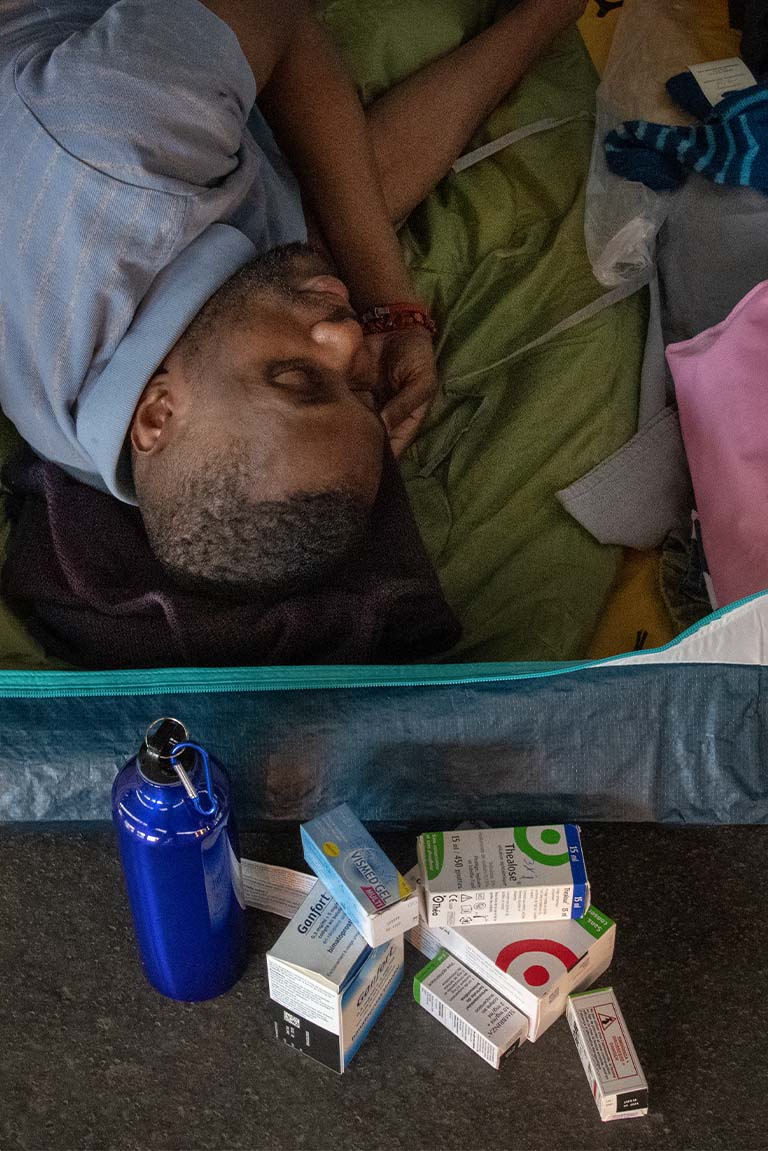
The right treatment is housing
Photo exhibition By Pascal Bachelet and Médecins du Monde
© Pascal Bachelet
In November 1993 in Paris, while the average temperatures were -5.4° degrees Celsius, hundreds of people were sleeping on the streets due to a lack of shelter space. In response to the overload of the Paris housing mechanisms, Médecins du Monde set up a large tent on a sidewalk in the 10th arrondissement, to provide basic healthcare for the people in need. In a call for solidarity, Parisians were also encouraged to mobilise.
The programme “SDF” (the homeless in French) which then became ‘’No Roof, no Health” was born.
Since then, Médecins du Monde has been working almost daily with people experiencing homelessness in Paris to provide listening, attention and medico-social support. Médecins du Monde has been warning the public and the authorities for 30 years on the lack of support and healthcare services for the homeless in Paris.
Despite some victories, it is obvious that the situation of hyper-precarious people remains disastrous. In fact, according to the Abbé Pierre Foundation, over 330,000 people are homeless in France, twice as many as ten years ago. The situation is all the more alarming because the health of the people living on the streets is extremely deteriorated, due to the conditions of living on the street, and the many barriers to access to rights and healthcare.
Let’s never forget that the life expectancy of the homeless is only 49 years old, against 80 years old for the rest of the population.
As Médecins du Monde’s commitment to people living on the streets has reached three decades, the purpose of this exhibition is to serve as a reminder that continuing to fight against homelessness is an absolute necessity. Through portraits and stories, fourteen people previously or currently homeless and suffering from health issues share their daily struggles and their indignation at the failure of the public authorities.
We concur with their message: it is urgent to end homelessness and to grant access to fundamental rights as well as access to healthcare, shelter and housing.
Pascal Bachelet
Photojournalist Pascal Bachelet wants to bear witness, share, disclose and understand the daily lives of individuals through social issues. His photographs are published by the agencies BSIP – Getty and by news magazines.
⸱
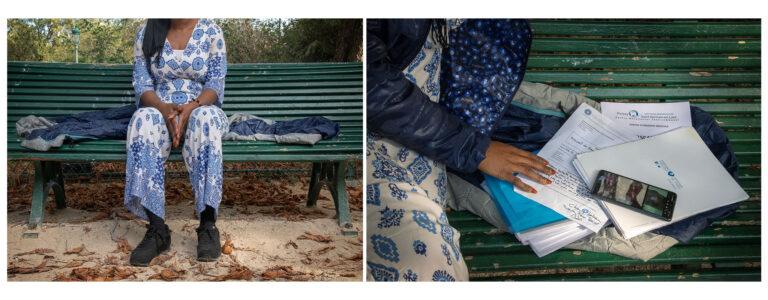
Justine
‘’I came to Paris over two years ago, and since then I’ve often been rough sleeping. I always try to pick places where I can be safe, to avoid sexual assault. I spent a lot of time in this park: during the day, I was often on this bench, and at night, I’d go further, behind the bushes. I suffer from vasculitis: my blood flow is restricted, which creates inflammation and joint pain. At the hospital, they said I should rest my foot as much as possible, so that blood flow can improve. But how can I rest when I have nowhere to stay? I always have this folder in my bag. It has all the places I went to and where I continue to go to get medical coverage, and to try to receive treatment. There are dozens of them; some were useful, others not so much. In some I felt welcomed, in others I didn’t.”
- Justine, 35 years old
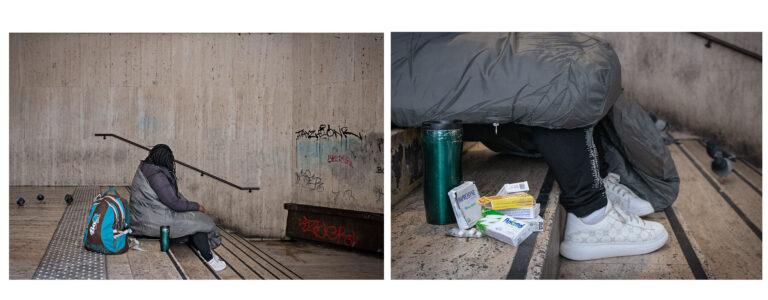
Anne
‘’I spent two and half months on the streets during winter. It was very hard. I was sleeping in a train station, on stairs. Sometimes at night, I would be on the metro or on night buses, and I’d stay on them all night until the next day. I wasn’t sleeping because I was always scared. I would often try to call the 115 (French number for emergency accommodation centre) but it would either ring for hours without any response, or I would be told that the shelter was at capacity. On the streets, I got depressed. Without a roof, a job, food, without care and hygiene, I would sometimes think of death. I would tell myself: “What kind of life is this?”. I was able to meet with a psychiatrist and she prescribed me a treatment. But I stopped taking it, because it made me drowsy, and I had nowhere to sleep. Here at my feet is the medication I was taking for my other issues: colds, digestive issues.”
- Anne, 39 years old
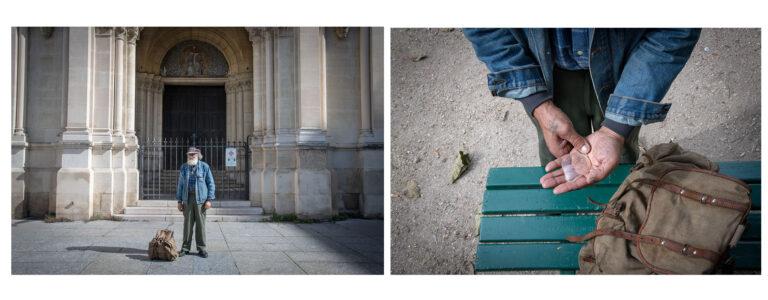
Daniele
‘’I’ve been homeless for over twenty years. I moved around a lot in Paris, and for many years I slept on this bench, in that square facing the church. For a long time I was healthy, but one morning, I was drinking coffee outside, and all of a sudden, I completely lost my eyesight. I was blind. I wasn’t in contact with any social workers or doctors, because I had bad experiences in the past. I only knew Médecins du Monde, so I went to them. They took me to the hospital to get surgery. I had a severe form of cataract. The eye shield in my hands was to protect my eyes after the surgery; I had to keep it on for several days. If I had really lost my eyesight, I would’ve jump in front of the metro. I don’t have a family, or a house. I have nothing. What would’ve become of me, blind, on the streets and all alone?”
Daniele, 66 years old
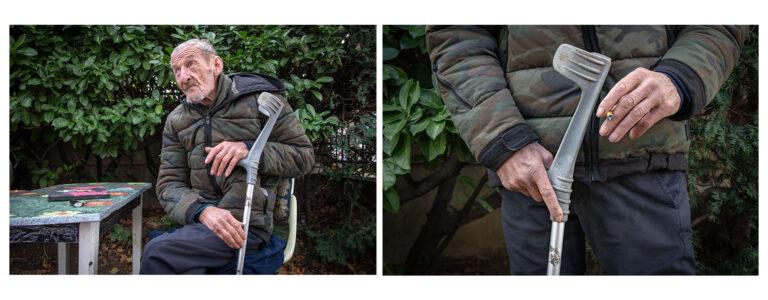
Gustave
‘’I’m 84 years old and I’ve been living on the streets for over twenty years. I live in a tent near the ring road of Paris. 3 years ago, I was violently assaulted on the streets. My ribs were broken, I had to stay in the hospital for two months. Since then, my health has deteriorated, I have to use a crutch at all times. I use it to walk, and it helps with the pain in my back and my legs. After the assault, a parish let me sleep here, in this enclosed outside space. I like to paint here, and I’d rather be here than in a retirement home. I need to feel safe, especially after the assault.”
- Gustave, 84 years old.
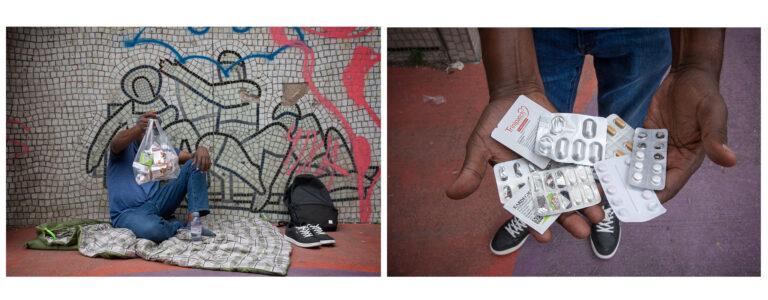
Yasir
“I’ve been homeless for over a year. More often than not, I sleep out on the streets. I have serious health problems: I have heart problems, blood pressure and kidney issues. The first time I was hospitalised in France, I stayed for two weeks in the intensive care unit, and then I had to go back to living on the streets. Today, I take 13 pills a day. But I can’t rest, and I’m stressed, so the medication isn’t working. When someone is on different medication every day, they should have a place to rest, they should have basic conditions to survive.”
- Yasir, 59 years old.
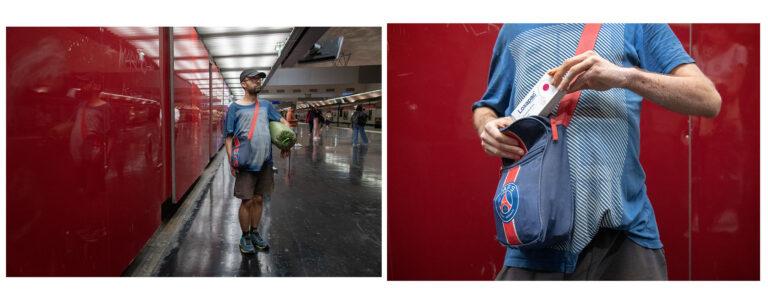
Kevin
“For three years I slept in different places: sometimes at my girlfriend’s, sometimes on the streets, sometimes in train stations. I mean, I wasn’t actually sleeping, because I had to be alert all the time. On the streets, you’re stressed and you’re scared; I’ve had death threats, I’ve been hit and robbed. When I was homeless, I would smoke a lot of cigarettes, and I’d drink four to five beers a day. It helped with the anxiety. I wouldn’t take the medication that was supposed to help me feel relaxed, because I thought it didn’t work. Now that I have a place, I’ve cut down on everything and I started psychiatric treatment again. But I’m in a hotel room in the suburbs and I don’t like it, it’s unsanitary. I’ve been on a waitlist for social housing for seven years. I’d like to have a place of my own.”
- Kevin, 28 years old.
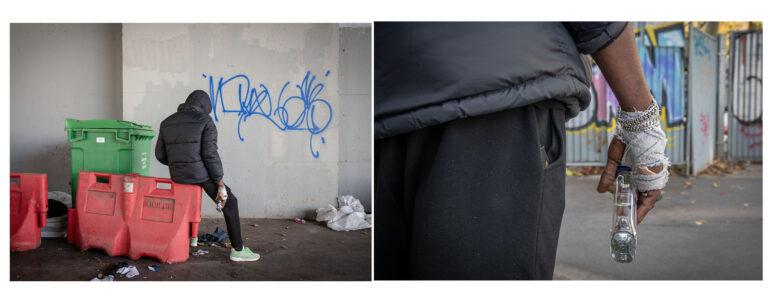
Dija
“I slept on a mattress under that bridge for several months. A lot has happened here, happy times and incredibly sad times. The city council cleared the place so everyone who used to live here is gone. Personally, I sometimes come back and hide to drink alcohol. I know, though, that alcohol doesn’t agree with me, I either get angry or too calm. The wound on my hand is because of alcohol, I cut myself with glass. But I have a real history with alcohol, I’ve been drinking for almost ten years now. But what I mean is that in life, you should never paint the alcoholic person as a bad or evil person. You just have to try to find out who they are, understand who’s behind the bottle they’re holding.”
- Dija, 28 years old
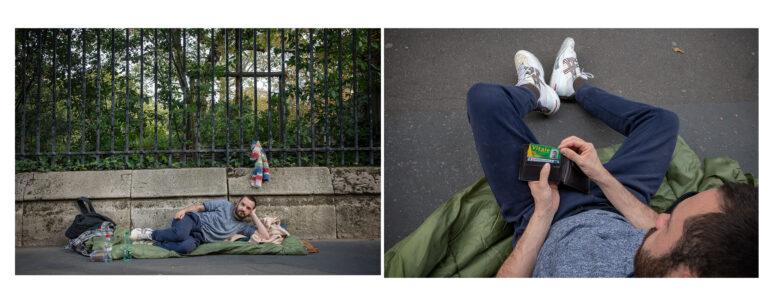
Mike
“I’ve rough slept for three years. Last year, I found a place to live, but after a few months, I couldn’t pay my rent so now I’m homeless again. On the streets, my Vitale card (French health insurance card) was stolen, and it was too complicated to get a new one without having a home address or any prospect. For that reason, I couldn’t access any healthcare services for months, and it impacted my health. When I had my place, I felt a lot better: I wasn’t cold anymore, I was sleeping well, my back pain improved. Because I was stable, I was able to redo all the necessary paperwork for the documents I had lost. Today, I’m doing everything I can to find a home again.”
- Mike, 26 years old.
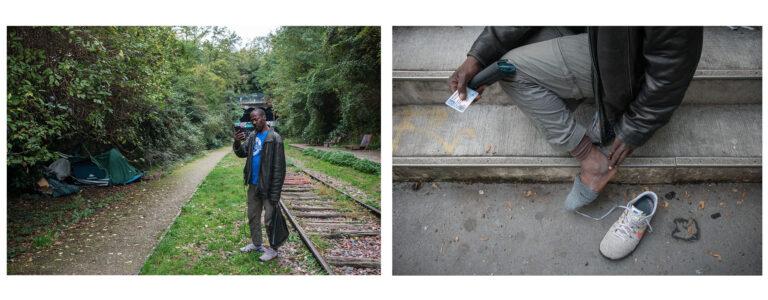
Mohamed
“I’m 50 and I was homeless for quite a while. I slept under that bridge for a long time. I was always working: if I had to go the market, I would, if I had to be up early to work, I’d get up early. Even when I was rough sleeping, I was working. With that I’d buy food, buy some stuff. I used to drink alcohol, a lot of alcohol. And then one day, I got into an accident and fractured my foot; I ended up in the hospital and it destroyed my life. When I left the hospital, I was back on the streets, with rods in my leg, shots and injections I had to do regularly. I don’t drink anymore, but I’m still disabled. I struggle a lot financially, I can’t do a physical job because of my disability, but I’m not eligible for financial aid either.”
- Mohamed, 50 years old.
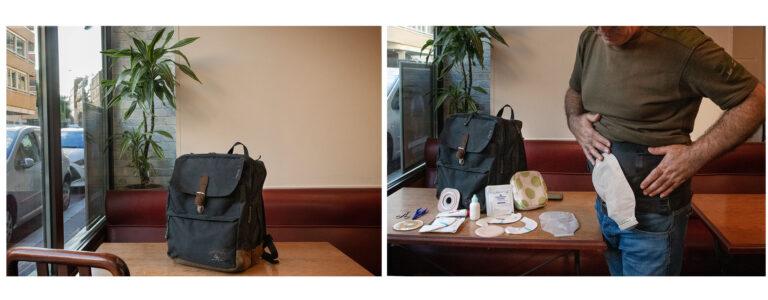
Samir
“I’ve been homeless for over a year now, ever since the ceiling of my apartment collapsed. At night, I sleep in the café where my brother works, on an armchair. I leave before any client comes in, and I come back at night once everyone is gone. I’ve been suffering from an intestinal disease for years. It’s hard, even dangerous, to not have a home with this disease: I have to change my bag in public restrooms that are dirty or with my unclean hands, which can cause infections. What I need is a place: then I could rest, take a shower, keep my paperwork somewhere safe and take care of myself. And I wouldn’t have to carry all that material on me all the time.”
- Samir, 49 years old
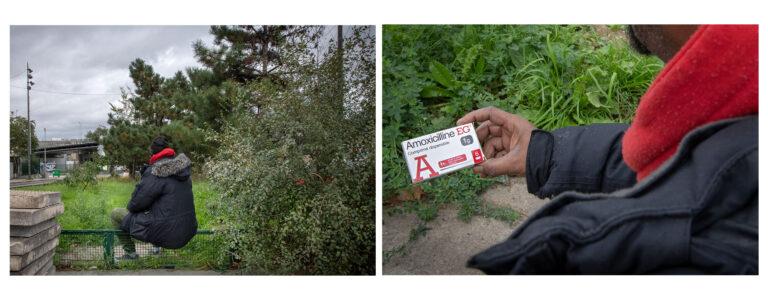
Ismaël
“I’ve been homeless for three years. I was on a lot of medication for a long time, then on crack. Now, I’m completely sober. But I’m still homeless. I spend a lot of time around here because it’s the first place I went to when I arrived in France. I get sick a lot because I’m rough sleeping and it’s cold. Recently, I started coughing a lot, my lungs were hurting. So I got back on the medication I was on some time ago, to try to get better. That way I can keep going to my job. I work in a restaurant.”
- Ismaël, 35 years old
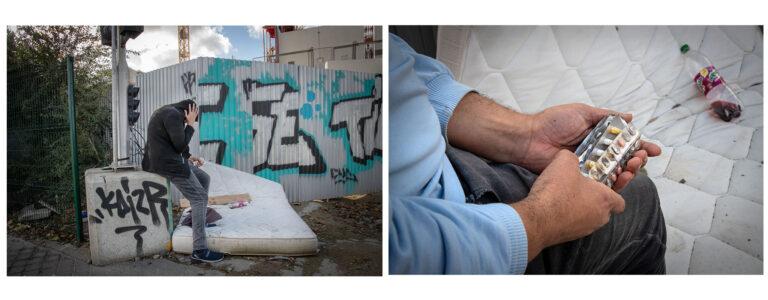
Manuel
“Often when you tell people you’re on medication, especially psychiatric medication, they get scared and react negatively. Yet I’m on 5 to 6 pills a day, mainly for my bipolar disorder, and despite that I’m never violent. There’s no reason to be scared of me. A friend brought me to this crossroad. For two months we slept right here in a tent, under the ring road, next to the slums. But every two to three months, the city council would destroy all the shacks. Yet we were clean, we tried to be respectful of the place and not to fight. I have a place now, but I might lose it because I’m behind on rent. I’m a worker, I work at the market, I get up very early, but the inflation and the current crisis is making it really hard.”
- Manuel, 45 years old
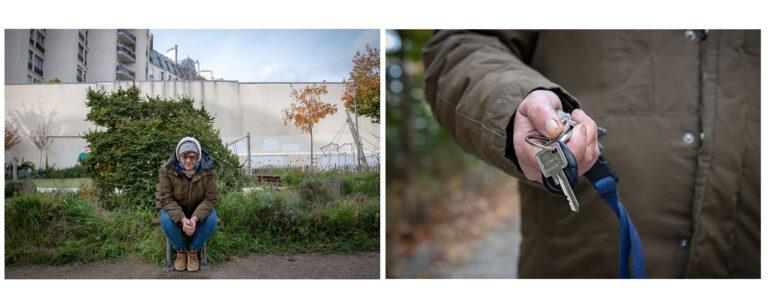
Sophie
“I lived on the streets of Paris for twenty years. Back then, there were a lot less homeless people, so when you’d call the 115 (French number for emergency accommodation centre) you could get a bed right away in a shelter for a week. Now, there’s barely any spot and when there is, it’s for a night at best. In 1997, I was assaulted on the street, and I lost my left eye. Now, I have a place, but even though I’m young, I’m paying the price for years of living on the streets: I have osteoarthritis in my lower back, I have pain in my tendons, and I often get bronchitis. I’m doing a lot better than before though, because I am stable now, and everyday this key reminds me that. However, most of the friends I had during that time died from the consequences of living on the streets. Housing and healthcare should be accessible to everyone.”
- Sophie, 50 years old
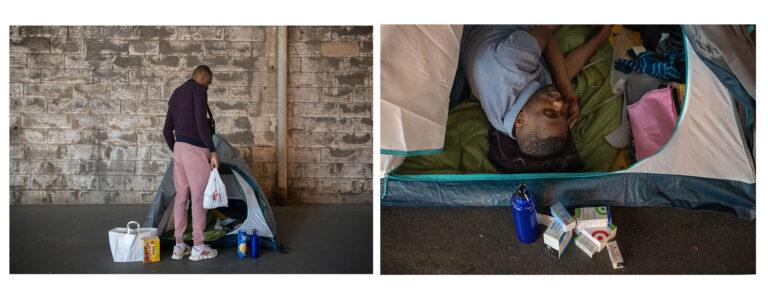
Yannick
“I lived on the streets for two years. I slept under a bridge, in a tent. At some point I felt like my eyesight was declining. I was able to ask an outreach patrol to take me to the hospital, and I learned there that I had glaucoma. I didn’t know what it was. I asked if I could get treated for it, and they said no, it was already too late, it was too advanced. Since then, I’ve been gradually losing my eyesight. When I was still living in a tent, I’d have to put in eye drops, it wasn’t easy. Today I live in a shelter, but my eyesight problems are making it hard for me to meet people in the shelter, or outside. Socialising is important, so that has an impact on my confidence and my mood”
- Yannick, 36 years old











